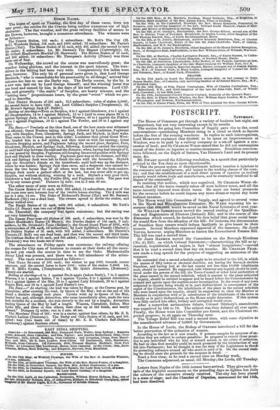POSTSCRIPT.
SATURDAY.
The motion for going into Committee of Supply gave rise to the, usual conversations—questioning Members rising in a cloud as thick as flksects before the feet of the evening wanderer. In replies to such interrogations,_
Lord MORPETH explained that 60,0001. to be spent on improvements at -- Windsor, was to be paid by a railway company as a set-off against a con- cession of land; and Sir CHARLES WOOD stated that he did not contemplate repeal of the duties on legacies or marine-insurances. Resultless conversa- tions followed, on the Rajah of Setters, Van Diemen's Land and its present state, &c.
Mr. EwAnT moved the following resolution, in a speech that particularly pointed to the Tea-duty as most objectionable.
ii That the present system of disproportionate indirect taxation is injurious to the commerce and manufactures, and unjust to the working classes of the coun- try; and that the establishment of a more direct system of taxation on realized property would relieve trade and manufactures, and be eventually beneficial to all classes of the community." In resisting this motion, which was negatived, Sir CHARLES WOOD ob- served, that all the taxes recently taken off were indirect taxei, and all the taxes recently imposed were direct taxes. He must see better prospects for the revenue befote he could impose any more dimctor repeal any more indirect taxation.
The House went into Committee of Supply, and agreed to several votes in the Naval and Miscellaneous Estimates. Mr. WARD repeating his as- surance that 600,0001. would be saved on the Naval Estimates of next year.
Sir WILLIAM SOME.RVILLE moved the second reading of the Qualifica- tion and Registration of-Electors (Ireland) Bill; and in the course of the discussion which ensued, he declared his firm belief that great social bene- fits would flow from the adoption of the bill: for' instance, the disconnexion of franchise from tenure would induce_landlords to give leases -te their tenants. Several Members expressed approval ofthe measure; Sir Jour( Yourw, however, urging Ministers to hasten the Encumbered Estates Bill. The bill was real a second time.
Sir Jour; HANMER moved the Committee on the Borough Elections (No. 2) Bill; on which Colonel StaTnonr,—characterizing the bill as ty- rannical, inquisitorial, and unjust, in fact "almost burglarious,"—moved that it be read a second time that day six months. Mr. CLLinLE8 Pius- sox made a long speech for the purpose of suggesting an extension of the measure.
He contended that a second schedule ought to be attached to the bill, in which the names of fifty towns or electoral districts, not having the borough elective franchise, and having had at the last census not less than 10,000 inhabitants each, should be inserted. He suggested, taht whenever any inquiry should be insti- tuted under the powers of the bill, the Town-Council or other local authorities of the place named in the second schedule, which is nearest to the place subjected to inquiry, should be entitled to appear and be heard before the Commissioners by counsel and agents upon the matters under investigation. In the event of any town subjected to inquiry being wholly or in part disfranchised in consequence of the report of the Commissioners, the inhabitants of the place in the second schedule who were heard upon the inquiry., should be empowered to elect the Member or Members in conjunction with or m substitution of the inhabitants of the town so (wholly or in part) disfranchised, as the House might determine. If this system were fully carried into effect, bribery and corruption would cease.
After a somewhat acrimonious debate, Colonel Sibthorp's amendment was negatived by 166 to 78. The subject was then debated all over again. Finally, the House went into Committee pro forma, and the Chairman re- ported progress; to sit again on Thursday next.
The Tobago Relief Bill was read a second time, with some objection to the unauthorized advance of 5,0001. by Government.
In the House of Lords, the Bishop of OXFORD introduced a bill for the better prevention of the seduction of women. According to the law as it now stands, if persons conspire for purposes of se- duction they are subject to certain penalties: he proposed to extend those penal- ties to any individual who for hire or reward assists in the crime of seduction. He had no idea that morality could be much promoted by the introduction of any bill into Parliament; but he thought it was the duty of the Legislature to throw its protecting influence around all who stood in need of it. On the second read- ing he should state the grounds for the measure in detaiL , Read a first time; to be read a second time on Monday week.
The Commons adjourned, as usual, till Monday; the Lords, till Tuesday'.


























 Previous page
Previous page